- Home
- Donald McCaig
Nop's Trials Page 5
Nop's Trials Read online
Page 5
“You can’t drain yours? We always drain ours in this sort of weather. It takes a mite longer to catch the prime when you get to the fire scene, but a slow priming pump’s better than a pump won’t do nothin’ at all.”
“Our pump’s got a little draincock underneath.”
“Oh, oh. Somebody forgot?”
“That’s right.” To his firemen: “Get that roof ladder up there. Just wrestle it over the porch. I don’t want nobody climbing up that roof without the ladder in place.”
“Well, Lewis. I guess we’ll be gettin’ on home.”
“Yeah. Thanks.”
“You-all ever find that dog of yours? I seen one of your posters outside the Kroger in town. Five-hundred-dollar reward. That’s a fair price to give for a dog. ’Course, I know how it goes. Man gets attached to an animal …”
“Dog’s worth a sight more’n that to me,” Lewis said. “Nobody’s seen him. Nor the coon dog that he was running with.”
“Two dogs together can get in a mess of trouble, where one dog wouldn’t.”
“I’ve heard that. Nop always stayed close to home.”
“Well, Lewis, if I hear anything I’ll surely let you know.”
“ ’Preciate it.”
Late on a subzero night, twenty men had gathered for the fire call. About half were volunteer firefighters. The other were neighbors who happened along. Most of them clustered in the front yard, gossiping. A chimney fire usually wasn’t dangerous though it could scare the pants right off you when it was your house. Many of these old houses had burned oil for years and then reconverted to wood stoves. People had gotten out of the habit of worrying about their chimneys and these new airtight stoves put so much creosote up the flue you had to clean it out every month or six weeks.
The house was tidy but the porch woodwork could have done with a coat of paint. This was the Full Gospel preacher. The Methodists and Presbyterians gave their preachers enough to keep up the parsonage but Lewis guessed the Full Gospels didn’t have so much money.
Jack Wade was the preacher. Several years ago Wade had lost an eye. Usually he wore glasses with one clear lens and one opaque one. Now he had a piece of cotton stuffed in the empty socket.
“I believe we’ll put her out directly, Mr. Wade,” Lewis said. “We got a ladder on the roof and we’ll drop some chains down her and clean all the gunk out and starve the fire. You mind if I go on upstairs and check the chimney?”
The preacher was flutter-handed. “Now, you go on right ahead. I’m sorry the house is such a mess. My goodness, I was just sitting down to eat when I heard that roar from the chimney, like to scare the life out of me. You go on upstairs, just help yourself. I’m sorry the house is such a mess.”
Lewis and Mike Pearson, assistant chief, climbed the stairs, feeling the chimney wall for hot spots. In some houses, the chimney mortar is old or rotten and the fire gets out and into the floor joists or walls. Lewis felt the warmth from the chimney fire but there wasn’t any place he couldn’t keep his hand.
“Wade says they rebuilt this chimney four years ago. Tiled her, bottom to top.”
“That’s fine, but I’ve known the chimney tile to crack, if it gets hot enough.”
“I wouldn’t want to put out a fire in this house,” the assistant chief said.
“Our number-two truck will pump.”
“Yeah. The other one isn’t worth nothing.”
On the roof Mark Hilyer dropped a chain down the clogged, flaming chimney and a cry came from the bowels of the house as the soot and ash billowed out around the thimble of the stovepipe, coating the entire downstairs with soot.
It’s a peculiar fact about firefighting. You can save a man’s house but if you track up his kitchen doing it, he won’t thank you.
Lewis could feel the vibration as the chain clunked around knocking the hardened lumps off the chimney walls. Lewis climbed into the attic and touched the chimney bricks at the floor and where it passed through the roof flashing. It was warm but not real hot. The mortar looked smooth, new, professional. Should be okay.
Mark Hilyer poured dry chemical down the chimney and it puffed, choked, and the roaring stopped.
In the kitchen, Lewis accepted the preacher’s complaints about the fine dust that covered every surface, every knife, spoon, pot and pan; refused the coffee (tea?) (“If I got something clean enough to boil water”) and stepped outside into cold that took his breath away. It must be bitter on the roof peak where his son-in-law was trying to collapse the roof ladder. It was funny how the fire department was such a family affair. The Goodwins—father, brother and sons—had had it until Lewis got elected and Mike Pearson and his brother would take it over when he quit.
Pearson had heard of a dog killed on Route 340 up by Boyce.
“That was a brown dog. Belonged to a man name of Roberts. Lives in the green house across from the motel there. Dog just loved to roam. Well, his roaming days are done.”
Lewis and Mark had plastered posters all over the county. A Xerox of Nop’s photograph, description and Lewis’s phone number. Five hundred dollars for information leading to the recovery of.
Eugene Hicklin had put out a few posters for Dixie and an ad in the Lost and Found. Eugene offered a reward for his pup’s return but never did say how much it would be.
Lewis Burkholder and Mark had visited most of the gas stations, grocery stores and taverns for thirty miles around. They’d bothered the sheriff, the state police, the dog wardens, even the game wardens. Nobody had seen a thing.
Lewis turned to Mike Pearson. “I was just sitting down to my dinner when this call sounded. This fire is knocked down now. You take the second unit. Mark and I’ll put the pumper back.”
Mark and Lewis rode together. They stopped at the Crossroads Exxon and woke up the owner to gas up because they always put it away with a full tank. One nice thing about the chimney fires: they never used water and didn’t have to refill the pumper’s five-hundred-gallon tank which was a nasty cold business, drafting from a narrow beach on the edge of the river.
The heater worked well. Lewis drove slow. The old pumper was pretty heavy and there was no sense pushing it going home from a fire.
“Mark, I want you to go to the firehouse tomorrow, first thing in the morning, and use a butane torch on the draincock. I believe you was the one who forgot to drain it, last time you put this pumper away.”
After a bit, Mark lit a cigarette. He’d quit tailor-made cigarettes and rolled all his smokes from a can of Bugler Tobacco. He always had a dozen ready-rolled smokes with him in a crush-proof Winston box. Lewis didn’t like them because they looked like marijuana cigarettes but he couldn’t say anything. ’Course Mark could have quit smoking altogether …
“Sorry,” Mark said. “Nobody told me about the drain.”
Mark had gone out on three chimney fires, one barn fire, one auto wreck and one brush fire but hadn’t had any of the state training. Lewis was figuring on getting the state instructors out for a refresher course in the spring. Winter was too rough to hold a fire school.
“Just make sure it’s working in the morning.”
“I told Jim Campbell I’d come over and help him load cattle in the morning. I don’t get paid for this.” Mark’s choppy wave indicated the truck, their turnout gear. “Jim Campbell promised me twenty dollars. You been lucky in your life, Lewis, if you never made a mistake. I have made several and they don’t surprise me like they once did. Sure, I’ll thaw the pump, after I load cattle.”
“You know,” Lewis said, “I surely wish your family had seen fit to come out to Penny’s wedding. It may be her only wedding, you know, and I would have liked to meet your kin.”
“My father, he ran out on us. Long time ago. There’s only me, my mother and Scottie.”
“My,” Lewis said acidly, “it sure is interesting to learn a little something about the people my baby girl married into.”
Mark blew air through his teeth. After a while he told Lewis a story Lew
is had already heard. Somebody had seen a stockdog in Sally Gap.
“There must be three hundred different stockdogs in this county. There’s Aussies and English shepherds and lassie collies and working collies. I can’t run down every one of them. You know what I think? I think Nop’s gone. I think some farmer down the road caught him and that coonhound in his sheep and shot them and left them where they lay. That’s what I think happened.”
“You’ve always said Nop wouldn’t wander off.”
“What else could have happened? He’s been gone three weeks now. By now, I would have heard something.”
They parked the pumper in the firehouse and hung their helmets and turnout gear in the big lockers on the side of the truck. Some volunteers carried their personal turnout gear (coat, boots and fire pants) in their own vehicle, but Lewis left his gear with the truck.
They didn’t fool around, but it was 11:30 before they got home and Lewis was so tired he’d lost his appetite. The lasagna was in the oven, on low heat. Most times, Lewis liked lasagna but this looked mighty unappealing.
Penny and her mother were at the kitchen table with cold cups of coffee. Beverly had her magazine. Penny was doing some baby knitting though she didn’t have the knack.
“How was it?” Beverly asked.
“Nothing at all. Every time that fire call goes off, I’m afraid it’s gonna be somebody’s house—a nasty fire, but it’s most always just brush or a chimney fire. I suppose I ought to be grateful.”
Penny said, “I’m glad you two can go out together.”
Lewis grunted.
Penny said, “I mean, it’s kind of nice, in this rotten weather to have some company.”
Mark put down his fork. “I think I’m gonna take me a glass of milk to the bedroom.”
“Something wrong with the food?” Lewis asked.
“Naw. I just don’t have any appetite. Come on, Penny, let’s hit the hay.”
Penny had a look in her eye. She took her husband’s hand. Lewis sure hoped they knew enough to stop having sex before the baby came. Lewis surely hoped Beverly had told them to stop. He looked down at his plate. Ugly lasagna, ugly green beans, ugly coleslaw.
“Good night,” Beverly said.
The Stink Dog limped over and laid her head on Lewis’s foot, which annoyed more than pleased him. You ain’t Nop, he thought but didn’t say. Stink went back to her corner and flopped down with a sigh.
“Lewis, you’re just picking at your food. Come to bed. I’ll rub your back for you.”
Lewis tried on a smile but it was shoddy material. “Sure,” he said.
By lamplight he watched his wife of thirty years as she readied herself for bed. A funny thing about women—how they thought they got less desirable as they grew older. Beverly had become inexpressibly more dear. Lewis didn’t know what he would do without her.
The bed dipped under her weight. Though there was none to overhear, she spoke softly, “You heard nothing about the dog?”
“Not a darn thing.”
“I hoped someone at the fire might have some news. Oh, Lewis, I’m so sorry.” She lay her hand on his chest and rubbed in a slow circular motion. “You know, maybe we should get another pup. It might be fun to have a pup in the house.”
“I just don’t have the heart for it, Beverly. Nop wasn’t a runaway. He never went farther than the barnyard unless I took him. Every morning, when I feed … God, it’s so much harder to work without him. He’d get out there, just doin’ his work and I’d stop what I was doing just to watch him. He was so full of himself, so beautiful …”
“Hush, now,” she said. “Hush, now, Lewis,” and she pressed him to her breast like he was a weary child.
Nop had been Lewis’s farm dog. Though he was young for it, he’d been Lewis’s trial dog too. Last fall, at the Blue Ridge Trial, Nop finished second. At the Hop Bottom Trial, he ran first. They weren’t the biggest trials—nothing to compare with the Stockdog Superbowl or Dothan, Alabama or the Kentucky Bluegrass, but to run a dog in the open class before his second birthday was unusual and invited comparison with Nop’s legendary forebearer, Wiston Cap, the great Scottish sire who won the Supreme Championship, defeating the finest dogs in all Britain before his second year.
In September, at the Innisfree Trials in eastern Maryland, that comparison was made. Many who saw Nop run at Innisfree said, afterward, they’d never seen anything like it.
The trial was held in a long cow pasture, bordered on one side by standing corn and on the other by a board fence. The pasture rose steeply and Lewis wouldn’t have wanted to be on it with tractor and mower.
The grass was short and dark green. The day was overcast and muggy.
Though Innisfree wasn’t a real important trial, it was conveniently timed to catch handlers on their way home from the Tennessee Open and attracted a pretty good crowd.
Ralph Pulfer was here with his famous Shep dog and his brother, Lewis Pulfer, had the red bitch, Dell, and a young dog, Liz. John Bauserman had brought his Nell dog and Rory, his five-year-old male. Bruce Fogt of Ohio was here with Hope, the bitch who’d won the Bluegrass two years ago and Jack Knox of Wisconsin had brought Craig and Jed.
They came in campers and vans and station wagons with metal screens to separate the dog compartment from the humans. Some towed their dogs on special trailers: flatbeds with dog cages bolted to the wooden platform.
Some handlers were stock farmers, some were vets. Richard Karrasch was a feed specialist. Tom Conn was a carpenter. One was a machinist, another a dentist, several were retired. They brought their wives and their kids or they came alone to sit in lawn chairs beside their campers with the cooler at their side. Many had come a thousand miles to see good dogs run.
Eighty spectators and perhaps as many dogs. Border Collies: large and small, white ones, red ones, blue merles (mottled with a bluish cast) as well as the more common black dog with white ruff and stockings. Some were thirty pounds; some big males, sixty. A few puppies were for sale.
The dogs lay in airline crates and stainless-steel kennels. Some were chained, others stayed underneath their masters’ trucks in the shade. They didn’t bark or run around, and quarrels between them were rare and brief.
The first stockdog trial was held in Wales a hundred years ago. Trials haven’t changed much.
The designers of the trial course intended it to replicate work every stockdog does on the home farm. The trial is more difficult than daily work—bringing a few strange sheep through trial obstacles is much tougher than moving a larger flock about.
A stockdog trial is an attempt to coordinate the brains and instincts of three animals: man, sheep and dog. The sheep are often uncooperative and are not helpless. The dog is severely penalized for biting and must move them by threat and bluff. A young ewe, running downhill, can outdistance a dog for several hundred yards. Since the ewe outweighs the stockdog by two or three to one, in any collision, it’s the dog who’s bowled over.
The course presents two sorts of obstacles: panels and the pen. Panels, which represent open gateways, are sections of board fence with a gap between them. The pen is a six-by-eight box.
Every dog starts his run with a hundred ten points. Deductions are taken for every tiny mistake. It’s a sport that rewards the conservative and the tried-and-true. The standard is precision, brilliance and calm. Anything less costs points.
The trial course is shaped like a crucifix, stood on its head. At the head stand the handler and his dog. At the foot, far up hill, sheep are released; three, four or five of them.
“Hsst.” The stockdog, operating solo, makes his outrun. He may run left or right but must not cross over once he starts. The perfect outrun is pear-shaped. The dog hooks behind the sheep without alarming them. He pauses.
Outrun faults include requiring a redirection command, stopping short, stopping long, swinging so wide the dog loses eye contact with his sheep or so near he alarms them.
The lift is the instant the sheep notice
the dog. The lift is a moment, a clash of wills, no more. If done skillfully, the sheep drift off downhill. A clumsy lift scatters them or panics them.
Coming on too hard is a fault. Freezing is a fault. Allowing the sheep to seek a path that isn’t directly toward the handler, that’s a fault.
At the finals of international trials the stem of the crucifix is eight hundred yards long and the sheep are barely visible from the handler’s position. In this country most outruns are shorter, a mere three hundred yards or so.
The dog fetches his sheep directly through the fetch panel to his handler’s feet. Any variation from a straight line is a fault. Any hesitation is a fault.
The fetch panel is slightly above the point where the stem of the crucifix meets the cross arm. The drive panel and crossdrive panel are at opposite tips of the cross arm.
The dog takes his sheep around his handler’s feet and through the drive panel. A faultless drive is straight from the handler’s feet through the exact center of the drive panel and a neat sharp turn onto the crossdrive.
The crossdrive traverses the course and passes through the crossdrive panel at the far tip. Faults include weaving, wavering, overhaste, balking.
The dog haunts his sheep across the field, slipping from side to side, always seeking fresh balance points and, if he’s very good and his handler is able to anticipate each sheep move, the line will be straight.
The dog turns his sheep once more and brings them to the pen where the handler will have opened the gate. The sheep never want to go into the pen. They can see the pen’s a trap. They aren’t stupid. It is a test of the dog’s power, pushing them one step at a time into that pen. Delays are faults. Pen circling is a serious fault; allowing the sheep to escape is a fault. Failure to pen will cost all the pen points.
After the handler and dog complete their pen, they release the sheep into the shedding ring, generally a thirty-foot grass circle marked with chalk or mowed short. One or more sheep are ribboned and the dog must shed these from the flock and hold them until the judges announce that the separation is good. “That’s a shed.”
From the handler’s first “Hsst” to the judge’s “Shed complete” can take ten, twelve or fifteen minutes depending on the trial and the number of dogs entered.

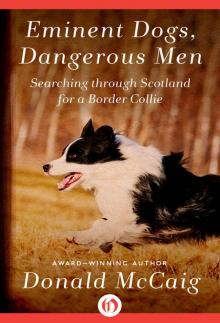 Eminent Dogs, Dangerous Men: Searching Through Scotland for a Border Collie
Eminent Dogs, Dangerous Men: Searching Through Scotland for a Border Collie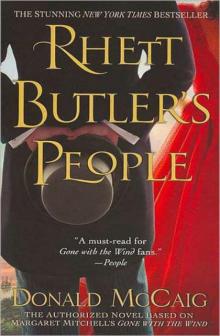 Rhett Butler's People
Rhett Butler's People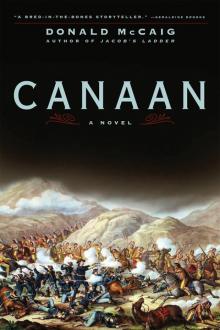 Canaan
Canaan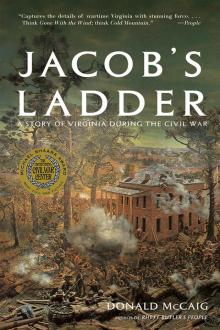 Jacob's Ladder: A Story of Virginia During the War
Jacob's Ladder: A Story of Virginia During the War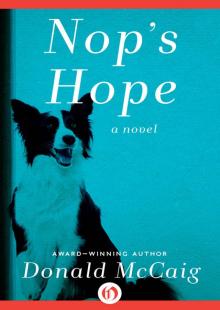 Nop's Hope
Nop's Hope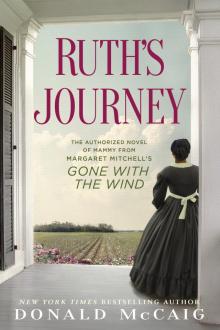 Ruth's Journey: The Authorized Novel of Mammy From Margaret Mitchell's Gone With the Wind
Ruth's Journey: The Authorized Novel of Mammy From Margaret Mitchell's Gone With the Wind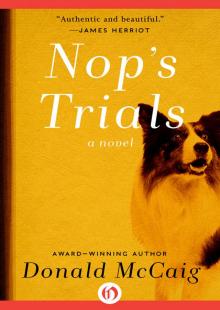 Nop's Trials
Nop's Trials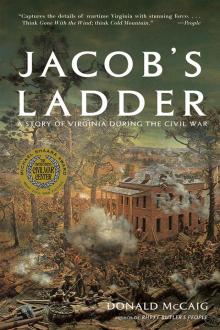 Jacob's Ladder
Jacob's Ladder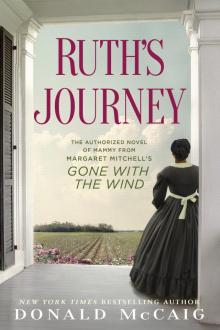 Ruth’s Journey
Ruth’s Journey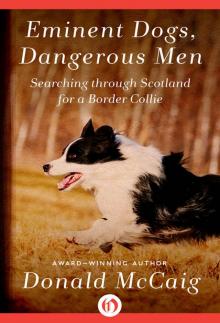 Eminent Dogs, Dangerous Men
Eminent Dogs, Dangerous Men